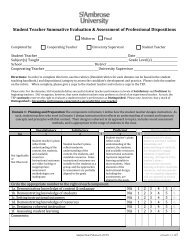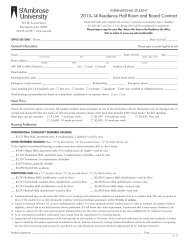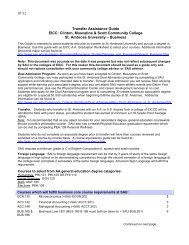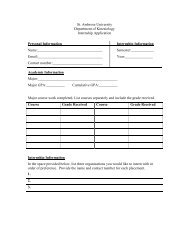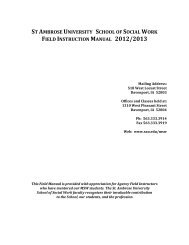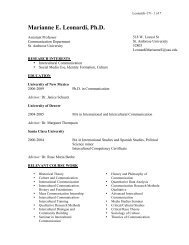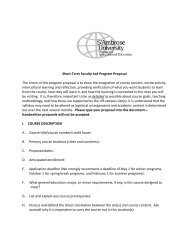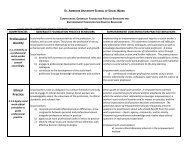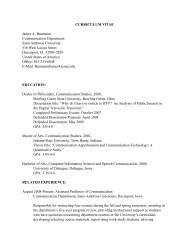student disability services faculty handbook - St. Ambrose University
student disability services faculty handbook - St. Ambrose University
student disability services faculty handbook - St. Ambrose University
You also want an ePaper? Increase the reach of your titles
YUMPU automatically turns print PDFs into web optimized ePapers that Google loves.
and non-verbal communication, and engage in highly repetitive behaviors.<br />
PSYCHIATRIC IMPAIRMENT<br />
Psychiatric impairments are broad and range from mild depression to chronic disorders such as<br />
schizophrenia or bipolar disorder. Negative stereotypes and the fact that these disabilities are<br />
typically "invisible" further complicate making accommodations for <strong>student</strong>s with these disorders.<br />
<strong>St</strong>udents with mental health or psychiatric impairments can be affected in many ways. They may be<br />
more susceptible to the common stressors of school involving academic demands as well as<br />
interpersonal relationships. <strong>St</strong>udents may have particular problems receiving, processing and<br />
recalling information during times of stress.<br />
Side effects from medication may also impact attention, memory, alertness, and activity level. The<br />
episodic and unpredictable onset and recurrence of illness can also interrupt the educational<br />
process.<br />
SENSORY IMPAIRMENT<br />
Sensory impairments include a wide range of impairments mainly affecting an individual’s ability to<br />
hear and/or see. An individual with a hearing impairment may be deaf or hard of hearing. An<br />
individual who is blind may not be able to see text, images, or colors. An individual with low vision<br />
refers to a range of vision problems that cannot be functionally corrected with glasses or contact<br />
lenses. An individual who is color-blind cannot make distinctions between certain color<br />
combinations.<br />
SYSTEMIC DISABILITIES<br />
Systemic disabilities are conditions affecting one or more of the body's systems, including the<br />
respiratory, immunological, neurological, circulatory, or digestive systems. There are many kinds of<br />
systemic impairments, varying significantly in effects and symptoms. Individuals with systemic<br />
disabilities differ from those with other disabilities because systemic disabilities are often unstable.<br />
This causes a person's condition to vary; therefore, the need for and type of reasonable<br />
accommodations may change.<br />
2011-2012 <strong>St</strong>udent Disability Services Faculty Handbook<br />
6




